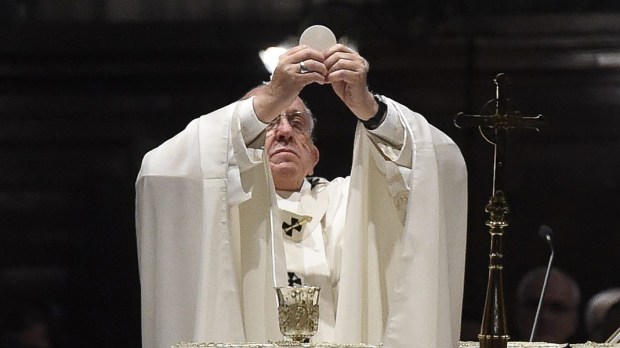The bishops of major U.S. cities dioceses have suspended public worship until further notice. Other diocesan bishops have dispensed Catholics from the obligation to attend Sunday Mass. With a mind to protecting those who are especially vulnerable to COVID-19, the measures taken by Church officials are in the best interest of public health.
But what does this say about Christian hope? What do we, we who are believers—the very body of Christ—make of our situation?
Remember the Church is still at prayer.
Closed doors don’t mean “cessation of worship.” Abbeys of monks and nuns are carrying on their unabated rhythms of prayers. Raising their hearts and minds to God in the psalms and Holy Mass, the Church’s contemplatives continue their exalted vocation of interceding for the faithful.
Your parish priest, too, will continue to offer Masses on behalf of his people. Even if his church is closed, your priest will be there, standing as mediator between God and his parish. He will also continue, insofar as he is able, to administer the sacraments to the sick and dying.
The treasure of cycles of prayer that mark the changing of times and seasons will persist, unwavering until the last days. Christ instituted the Church to stand through the last days, and stand it will.
Even though churches may cease holding public Masses, many will remain open. Make visits to the Blessed Sacrament, joining the Church in prayer through your private devotion.

Read more:
Bishop Barron: What is happening at Mass?
Tune in to Mass online, on television, and on the radio.
Many tremendous resources exist to join the Church at prayer. National networks like EWTN and CatholicTV will make it possible for Catholics to participate in Holy Mass while homebound. Many dioceses also offer local broadcasts of Mass.
Further, in light of the COVID-19 crisis, many priests are making efforts to stream their celebrations of Mass or their Sunday homilies, online. Check your diocesan and parish websites to see what your priests may be offering.
Some chapels even provide live streams of Eucharistic adoration. If you are in the habit of visiting an adoration chapel, make your typical visit online! Check this website for some possibilities.
Real graces are being offered through these different media, so take advantage of them!

Read more:
This 13th-century nun watched the first “live broadcast” of a Mass
Actualize your participation in the Mystical Body.
If you are living in a place where the bishop has, for the time being, halted public Masses, make a spiritual communion.
What is a spiritual communion? It is the act of drawing on the real graces conferred by your baptism to unite you to God. God dwells in our hearts; we believe, by baptism, that the Holy Trinity abides in us. Making a spiritual communion, then, is the calling upon that reality.
Believers can continue to gather “spiritually.” Why not continue to pray the prayers and readings of the Mass at the very time you typically attend? Believers can then be joined, knowing they are still praying together.
Begin by making the Sign of the Cross. Then read the readings aloud with your family (these can be found in publications like Magnificat, the daily Roman Missal or online at the U.S. Bishops’ website). In place of a homily, read a few pages from a spiritual classic, such as The Imitation of Christ, The Sinner’s Guide, or On Loving God. These are readily available online. Then offer petitions, saying out loud your prayers for the Church, remembering especially those affected by COVID-19. Conclude by praying the Our Father and making the Sign of the Cross.

Read more:
What is the Liturgy of the Hours?
Grace through charity.
The recurring temptation in any serious crisis is to allow the selfish instincts of survival to overtake Christian prudence and charity. The reality is that Christians have always been identified by their love for the sick, not their indifference to suffering!
If you are healthy and able, volunteer for those at risk. Seek out people in your local parish who may be in need. As large-scale operations are likely to be put to the test responding to this outbreak, grassroots charity will be more powerful.
The reality is that Christians have always been identified by their love for the sick, not their indifference to suffering!
Far from being simple activism, the love shown in times of crisis mirrors the very love God has for his sons and daughters.
Christians cannot ever be alone. No disease, illness or crisis has the power to separate us from the love of Christ, which alone sustains us. We are a people who will continue to have hope!
The current public health epidemic is part of the cross we will carry this Lent. Under its weight, let us not stumble, nor falter. Embracing the penitential aspects of this particular Lenten season will purify us all, allowing the love of Christ that conquers all things to shine ever victorious.

Read more:
These saints know firsthand about surviving pandemics

